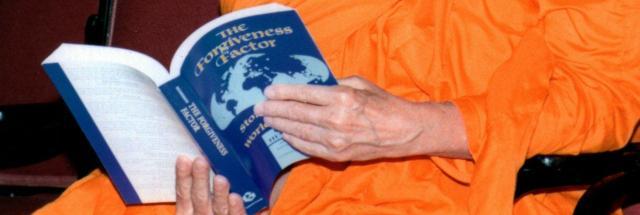Jim Beggs, Australian labour leader
KBOO 11 February 1988
Australian longshoremen, or wharfies, as they are called, have a delightful sense of humor. It is in their nicknames – ‘the judge’ because he sat on a case all day, ‘Bungalow’ because he had nothing upstairs, ‘London fog’ because he never lifted. My friend Jim Beggs is no exception. I remember him speaking to students at Oxford University. ‘I went through Oxford, too,’ he said in a broad accent that almost needed an interpreter, ‘on a bicycle.’
I first met Jim in Calcutta, India, nearly 30 years ago. He was then a young trade unionist on the Melbourne waterfront. I remember playing together on a field hockey team with him. That visit to Calcutta made him realize how, as he put it, the other half lives.
Today Jim is the National President of the Australian Waterside Workers Federation. The young man who joked that before he became active in his union the largest crowd he had ever spoken to was in a phone box and who preferred golf and duck-shooting to union meetings has come a long way. So has his industry. Today a handful of men on a container ship can do in 30 hours the work of 100 men in two weeks on a general cargo ship. When he started work there were 28,000 wharfies in Australia. Today there are 5,500.
Jim Beggs comes to mind at this time because in the last days two publications which crossed my desk have referred to him. The first was the ‘Christian Science Monitor’. Last month the paper described how two million Australians tuned in regularly to a radio program called ‘The search for meaning in life.’ Apparently, for an hour host Caroline Jones, according to the paper ever-so-gently coaxes Australian guests from all walks of life- politicians, musicians , unionists, business people – to reveal their search for spiritual values. Her program is the Australian Broadcasting Corporation’s highest-rated night time national radio program. It is rebroadcast three times a week. It won the 1987 United Nations Day prize for radio programming dealing with peace or conflict resolution, and plans are being laid for her to visit the US this year to interview prominent American citizens.
As I read on I suddenly noticed that she had done an interview with Jim Beggs. She asked him, ‘Making a decision to listen to the still small voice, to try to discern the plan that God had for you, in practical terms, how did you do that, and how is that a part of your daily life?’ Beggs replied, ‘We do try, my wife and I each morning, to take that time to listen and be quiet. To read something of spiritual value… we negan to write down these thoughts, and a new reconciliation happened between my wife and me.’
The second publication which referred to Beggs was the latest issue of the international magazine ‘For a Change’ which carries a profile of the union president.
Interestingly, the profile concludes with another quote from that same radio interview. ‘Many people today feel rather powerless,’ Caroline Jones said to him. ‘Your way of life suggests that as an individual I do have some power to make a difference.’
‘I am absolutely convinced of that,’ replied Beggs. ‘I am an ordinary person: no education: used to be part of the apathetic majority of the trade union movement. But history is made up of individuals who have turned the tide and most of them have been ordinary people. I say to people who ask, God has a plan for your life. You may not be meant to be a leader of your profession. But if you try that experiment my wife and I made thirty-two years ago, you will have that peace of heart which is more important than wealth and power. You will never know the effect you have.’
The profile in ‘For a Change’ by Australian journalist Christopher Mayor describes the change that came in Beggs’ life and the kind of lead he is giving in his country. When he began, he says, there was no retirement pension and ‘when people heard you were a wharfie they wanted to lock up the silver.’ Today the industry has become ‘the most progressive in Australia.’
It was Beggs’ next door neighbor who introduced him to the idea that if you wanted to see things different the best place to start was with yourself. This neighbor who was in dock management was a living demonstration that people could be different. The neighbour challenged Beggs to let God work through him to create a new spirit in the port of Melbourne.
Over the years, first with restitution for things he had stolen and giving up anti-Catholic prejudice, Beggs cleared the decks for an approach that enlisted people of different backgrounds and eventually after many attempts projected him into a different kind of union leadership. He and his wife, he says, developed two principles, not to take sides and to treat the union executive as a family. He believes in doing what is right, he says, no matter who gets thumped.
His leadership is not restricted to industry affairs. The profile describes how he starts each week at 7 am Monday morning with a core-group of friends from different walks of life concerned about the nation and the world, and united in their desire to find out what God wants them to do.
Beggs, like other wharfies, has also been given a nickname. It refers to the first thing he put right after his neighbor’s challenge. It was to return a clock he had lifted from some cargo to the company. His nickname: ‘Daylight saving’ because he put the clock back.

